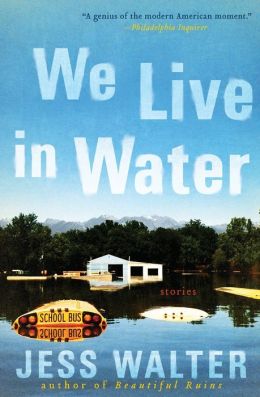Recently, I found a story I wrote some time ago. It’s a
sketch really, an idea barely fleshed out, something to pass the time.
A young women finds herself the contestant on a television dating show, a
premise which doesn’t seem particularly exciting or innovative after the deluge
of reality programming over the past decade or so. This writing predates most
of it, although obviously not American
Idol, which is mentioned, or The
Dating Game, or even This is Your
Life. I also found it an interesting piece because Julie and her brother
could be early manifestations of two characters I eventually spent much time
on—middle-aged Gina and her younger brother, Ian, in a novel called Fortress for One. Anyway, here’s the
short story, mostly rough but I think, with some smooth parts. (And wouldn’t The Love of Your Life would make a great
play?…)
“What
the hell, Junior?” Julie climbed into the car and glared.
“Juju,”
Junior said calmly. “Breathe.”
“I said
two-thirty!”
“They
won’t start without you.” He grinned, crooked teeth gleaming, coffee-colored
eyes like a dog that won’t leave.
She
sighed. Her little brother.
…Twelve
days ago, she got the call…
“Is
this Julie Renate Sandoval?”
“Yes.”
And her thoughts went immediately
to St. Theresa’s Parochial, where they always used full names. The nuns had
loved Junior, of course; behind their backs he called them The Monochrome Despots.
“This
is The Love of Your Life,” the man
said. “We’d like to put you on.”
“Oh,”
Julie said.
“You’re
aware of the application,” he asked, “submitted by your coworker, Jeannie
Mackeroy?”
It all
came raining down. A bottle of wine after work, Jeannie’s assurances, Junior’s
jokes. Her brother said Julie’s best shot at happiness was serial monogamy,
each chapter ending with a bubble bath and a new hairstyle. Jeannie told him
they couldn’t all be queens. And now it was happening.
Junior
dropped her backstage. Long hallways and a scurrying guide. Up front, the set
was a huge, carpeted kidney bean.
“How
are you, Julie?” Lance Corazon, the host. His eyes were beautiful and strangely
unkind.
“Alright,”
she mumbled.
He
pulled her elbow, twirled her around. “Audience, are you ready to help Julie
find The Love of Her Life?”
“Yes!”
they shouted.
Lance
beamed. “Julie, you’ll be placed in The Chastity Room. Finalists have been
chosen by our computer, based on compatibility scores, DNA testing and input
from your friends and family.”
Julie
sat on a plump red couch. When the doors to The Chastity Room opened, sawdust
stretched before her. She squinted in the half-light of a vast room.
“Over
here,” a man on a barstool called.
Randy
was a computer technician who liked to ride mechanical bulls. He had thinning
blonde hair and colorless lips.
“Where
are the cameras?” Julie asked.
“You
can’t see them.”
“Wow,”
she said. “This is awkward.”
Suddenly,
a voice boomed: Please refrain from such
comments. Unproductive. During the simulated date, avoid mentioning the
simulation.
“Sorry,”
she whispered.
Randy
shrugged.
Again,
the voice: We’d like to interject a
Conversation Starter, based on relevant information from your dating past.
Randy
scooted to the edge of his seat. Julie wasn’t sure if he was The Love of Her
Life. Maybe at first everyone found The Love of Their Life reminiscent of a
flaccid sea creature.
Your Conversation Starter comes from Julie’s
college boyfriend, Brad Kanwin. Brad says Julie was awkward in social
situations, often making inappropriate sounds or jokes.
She
remembered Brad, of course. Junior called him Big Top PeeWee, because of his
large head and small penis, although she’d been unnecessarily cruel in that
regard.
“The
last I heard of Brad Kanwin,” she said, “his hand became paralyzed and he went
blind.” She laughed alone, wondering if the joke was inappropriate. Randy
pressed a buzzer underneath the bar.
Her
second date wore red sneakers, a “People are People” t-shirt and a loosened,
narrow tie. Immediately, Julie used her 50 Ways to Leave Your Lover pass to
prematurely end their simulated Italian restaurant date. Maybe she’d be
finished in time to catch American Idol with
Junior, she thought as she left.
Date
number three. At the bottom of a flight of stairs, Reuben Straverskey stood
near a gondola and a gurgling canal.
“Reuben—what
the hell?”
“I
didn’t know it was you,” he said.
Julie
had been lusting after Reuben for months; only Jeannie knew. They all worked at
the same bank.
With a
push from the gondolier, they were on their way. Again, the cameras were out of
sight.
“So,
did they find those checks on Friday?” she asked.
Reuben
licked his fingertips and smoothed his eyebrows, a strange and regular habit that
only now struck her as completely ridiculous. “Naw,” he said. “Gunderson was
beyond lunacy, the drama king.”
She
shifted her weight and the boat dipped. “Is it weird, being here?”
“I
don’t know.”
The
voice: Please refrain from talking about
your reactions to being on the show. Irrelevant.
“I
thought you had a girlfriend,” she whispered.
Please refrain from whispering. Futile.
They
rode in silence. Julie thought: If I was watching this episode, I’d turn it
off. And she suddenly realized that Reuben was too goofy to be considered, that
her comments to Jeannie only helped to pass time at work and that Reuben,
although hysterical behind the bank counter, wasn’t as stimulating on a
simulated canal. Besides, what would Junior call him?
The
gondola hit shore at The Love of Your
Life. Julie wondered how long she’d been floating. Lance helped her out of
the boat, which then glided away with Reuben still onboard.
Above,
a screen flashed details from her life: Favorite Movie – Urban Cowboy; High School Music Choice – New Wave; Career
Aspiration – Head Teller. At the top, one word blinked continuously:
UNMATCHABLE.
Julie
stepped down from the giant kidney and saw him immediately. Tall and handsome,
a mouth full of crooked teeth. “Junior,” she said. “You’re still here.”























